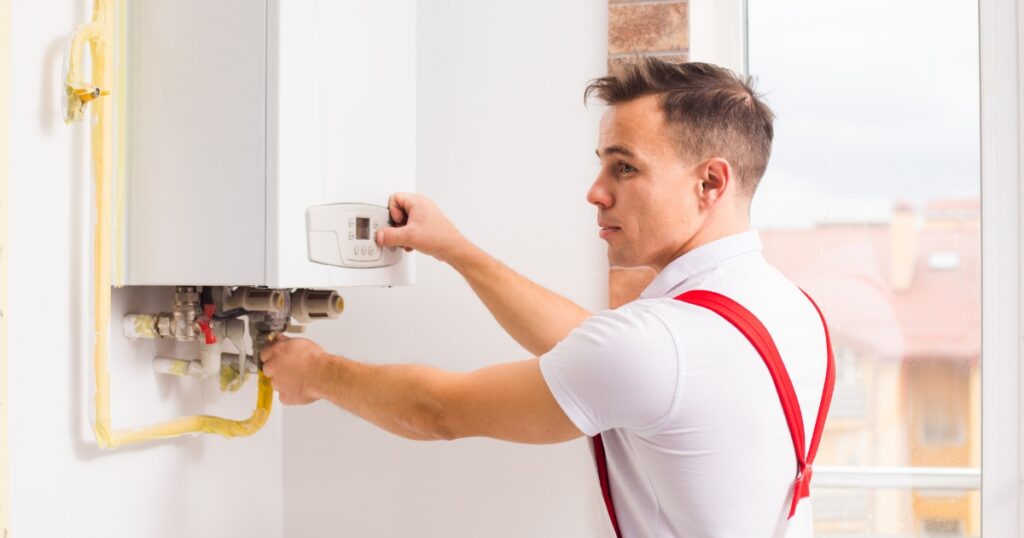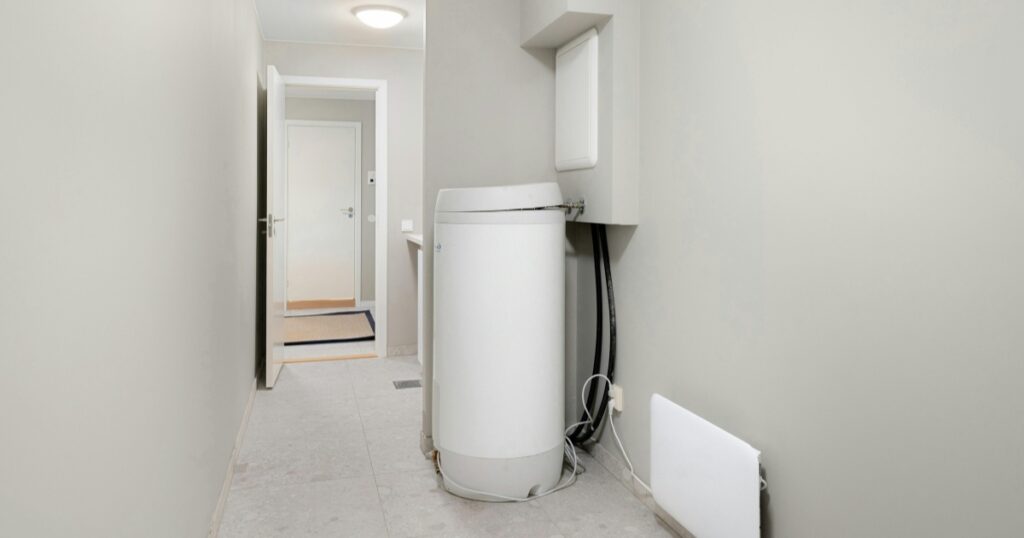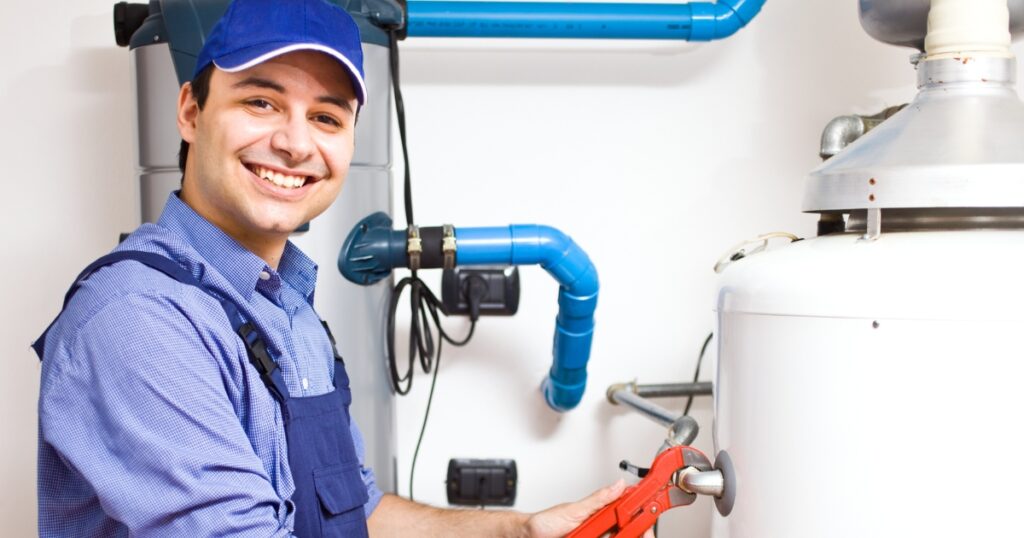Ever had that moment where you turn on the tap and instead of crystal clear water, you’re faced with a stream that’s either scalding hot, bitingly cold, or looks like it’s been borrowed from an old rusty ship? It’s fair dinkum frustrating! We totally get the annoyance of sediment and rust playing havoc with your hot water heater.
But no worries, we’re here to lend a hand. Follow along as we guide you step-by-step to sort out these pesky problems, ensuring your system is back to providing top-notch hot water before you can say ‘No dramas!’.
Key Takeaways
- Flushing your hot water tank annually helps remove sediment, prevents noisy operation, and maintains efficient heat transfer.
- Look out for signs of rust or corrosion, such as discoloured water or unusual noises, to address these issues promptly and prevent further damage to your hot water system.
- Seeking professional maintenance for your gas hot water system can help you identify and resolve pilot light problems, ensuring a consistent supply of hot water in your home.
- Regularly inspecting for leaks and addressing them promptly can help maintain efficiency and prolong the lifespan of your hot water heater.
Overview of Common Problems with Gas Hot Water Systems
Gas hot water systems commonly experience fluctuating water temperatures, frequent pilot light outages, rust and corrosion buildup, as well as noisy operation.

Fluctuating Water Temperature
We’ve all experienced that sudden shock of cold water during a nice, hot shower. Fluctuating water temperatures can be really frustrating and are a sign that your gas hot water system might need some attention.
Often, this inconsistency is due to issues with your heater’s thermostat or could indicate a more serious problem like a buildup of sediment affecting the heating element.
To keep showers comfortable and consistent, it’s wise to check on the health of your hot water system regularly. Sediment accumulating in the tank can interfere with temperature control and could lead to overheating or too-cool temperatures.
Regularly flushing out the tank helps maintain steady heat output, ensuring everyone in your household has access to reliable hot water when they need it.
The Pilot Light Going Out Frequently
If you’ve noticed your gas hot water system’s pilot light going out frequently, it could indicate underlying issues that need attention. An occasional outage is normal, but frequent extinguishing may signal problems like a faulty thermocouple, clogged pilot tube, or insufficient gas supply.
These issues can disrupt the heating process and result in inconsistent hot water flow. It’s essential to address this promptly as unresolved pilot light problems can lead to inconvenient cold showers and a complete loss of hot water.
Scheduling professional maintenance can help identify and rectify the root cause of the pilot light troubles while ensuring optimal performance of your hot water heater system. Regular checks by experienced technicians will help maintain a reliable and efficient hot water supply for your home.
Rust and Corrosion Buildup
If you’ve been noticing rusty or discoloured water coming out of your taps, it could be a sign of corrosion and rust buildup inside your hot water system. This accumulation can lead to leaks, fluctuating water temperatures, and noisy operation.
Sediment buildup is another common issue that can cause the same problems in your hot water heater. Flushing the tank regularly and addressing corrosion and rust issues promptly are essential for maintaining an efficient and problem-free hot water system.
Regular maintenance, including flushing the tank to remove sediment buildup and checking for any signs of corrosion, can help prevent costly repairs down the line. It’s crucial to address these issues as soon as they arise to ensure that your gas hot water system continues to function properly and provide you with reliable access to hot water.
Noisy Operation
Sediment buildup in your hot water heater can cause noisy operation. The buildup settles at the bottom of the tank and creates a popping or rumbling sound during the heating process.
This occurs when the sediment traps water underneath, causing it to boil and make noise as it’s being heated.
Ignoring noisy operations can lead to more serious issues like reduced efficiency and potential damage to the tank. It’s important to address this problem promptly to prevent further damage to your hot water system.
Importance of Regular Maintenance for Hot Water Heaters
Regular maintenance for hot water heaters is crucial to keep them heating and problem-free. Neglecting maintenance can lead to costly repairs or even replacement of the entire system.
Learn how you can maintain your hot water heater to avoid these issues by reading more!
Keep it Heating and Problem-Free
Regular maintenance is crucial to prevent sediment buildup and rust issues in your hot water heater. Flushing the tank annually helps remove accumulated sediment, maintaining efficient heat transfer and preventing noisy operation.
Additionally, inspecting for signs of corrosion and promptly addressing any leaks can prevent further damage to the system and ensure consistent hot water availability. Replacement of anode rods should be considered every few years to mitigate rust problems in the tank.
Professional maintenance services can assist in keeping your hot water heater problem-free, ensuring reliable performance for years to come.
How Do Gas Hot Water Systems Work?
Gas hot water systems work by utilising a gas-powered burner to heat the water. When cold water enters the tank, the gas burner ignites to warm the water inside. As the water heats up, it rises to the top of the tank and is drawn out when needed through a pipe connected to your home’s plumbing system.
This continuous process ensures that you have access to hot water whenever required.
The heating process in gas hot water systems is controlled by a thermostat, which monitors and regulates the temperature of the water inside the tank. Once the set temperature is reached, the burner turns off until more hot water is used and then reignites to maintain a consistent supply of heated water.
Understanding how your gas hot water system works can help you troubleshoot issues effectively and communicate clearly with professionals if needed for repairs or maintenance.

Troubleshooting Rust and Sediment Issues
To tackle rust and sediment issues in your hot water system, consider flushing the tank regularly, detecting and preventing leaks, as well as addressing temperature fluctuations. For more tips on troubleshooting these problems, read our full blog post!
Leak Detection and Prevention
To find and prevent leaks in your hot water system, check for water accumulation around the base of the system. If you notice any pooling, investigate further to identify the source of the leak and take steps to prevent future issues. Here are some tips for detecting and preventing leaks:
- Inspect all connections and valves for signs of moisture or corrosion.
- Look for rust spots on the tank or fittings, as they may indicate potential leak points.
- Test pressure relief valves regularly to ensure they are functioning correctly.
- Check for any condensation on pipes or fittings which could lead to future leaks.
- Consider installing a drain pan under the hot water system to catch any small leaks and prevent water damage.
Temperature Fluctuations
After addressing leak detection and prevention, it’s important to be aware of temperature fluctuations in your hot water system. Fluctuating water temperatures are often a sign of sediment buildup or rust issues within the tank.
These problems can cause the heating elements to work less efficiently, leading to inconsistent temperatures when you turn on the hot water tap. If you notice sudden changes in water temperature, it may be time to check for sediment buildup or rust issues as part of your regular maintenance routine.
When to Seek Professional Hot Water Heater Repairs
If you notice inconsistent hot water, unusual noises, sludge or rust buildup, discoloured water, or leaks in your gas hot water system, it’s time to seek professional hot water heater repairs.
Inconsistent Hot Water
If you notice an inconsistent hot water supply, it could be due to sediment buildup in the tank. The sediment can interfere with the heating process, leading to uneven heating and temperature fluctuations.
Another common cause of inconsistent hot water is corrosion or rust inside the hot water system, affecting its ability to heat water evenly.
Addressing these issues promptly is crucial to ensure a consistent supply of hot water in your home. Regular maintenance and professional inspections can help identify and resolve these problems before they escalate into major issues that require costly repairs or replacements.
Unusual Noises
Rust and sediment buildup in your gas hot water system can lead to unusual noises, such as popping or cracking sounds. These noises are often caused by the accumulation of sediment at the bottom of the tank, resulting in steam bubbles bursting through the sediment layer during the heating process.
Additionally, corrosion within the tank can cause banging or rumbling noises as it disrupts the normal operation of the hot water heater. If you notice these unusual sounds coming from your hot water system, it’s important to address them promptly to prevent further damage and potential leaks.
Regular maintenance, including flushing out sediment and checking for rust buildup, is crucial in preventing these issues. Neglecting these unusual noises may result in a compromised hot water system that requires costly repairs or replacement.
Sludge or Rust Buildup
If you’ve noticed the hot water heater making unusual noises, such as banging or rumbling sounds, it might be a sign of sediment buildup. Sediments, like sludge or rust, can accumulate at the bottom of the tank over time, creating noise as it moves around and interferes with heating elements.
This buildup can also cause inefficiency in heating water and lead to corrosion issues within the tank. Regular maintenance is crucial to prevent sediment from causing damage to your hot water system – flushing the tank and inspecting for signs of rust are essential steps in keeping your system running smoothly.
Regular inspections can help identify early signs of sediment or rust buildup before they lead to major issues with your hot water system. Sediment accumulation not only affects the performance but also reduces the lifespan of your water heater.
Discoloured Water
When your hot water appears discoloured, such as brown, red, or rust-coloured, it could indicate corrosion and rust inside the storage tank. This can be caused by sediment buildup or anode rod corrosion- the most common cause of rust in hot water tanks.
If you notice discoloured water coming from your taps, it’s crucial to address this issue promptly to prevent further damage to your hot water system. Regular maintenance and professional inspections can help identify and resolve discoloured water problems before they escalate.
Flushing the tank regularly and replacing corroded parts are effective ways to prevent sediment buildup and address rust issues in your hot water system. By staying proactive with maintenance routines, you can ensure that your hot water heater continues to provide clean and clear water for everyday use.
Leaks
Hot water system leaks can be a sign of serious problems with your hot water heater. Leaks may occur due to corrosion and rust in the tank, leading to water escaping through cracks or holes.
It’s important to address leaks promptly as they can cause water damage and potential safety hazards in your home.
If you notice any signs of leaking from your hot water system, it is essential to seek professional repairs immediately. Ignoring leaks can lead to further damage and costly repairs down the line, so it’s crucial not to delay in addressing this issue.
Regular maintenance and inspections can help prevent leaks from occurring, ensuring that your hot water system operates efficiently. Keeping an eye out for any unusual moisture around your hot water heater is imperative in safeguarding against potential leaks.
Let Your Hot Water Heater Issues Be Addressed
In conclusion, addressing sediment buildup and rust issues in your hot water heater is crucial for maintaining its efficiency and prolonging its lifespan. Flushing the tank regularly and keeping an eye out for leaks can help prevent these problems.
If you notice unusual noises, inconsistent hot water, or discoloured water, it’s best to seek professional repairs to address these issues promptly. Regular maintenance and swift action can ensure that your hot water system operates smoothly and reliably for years to come.






